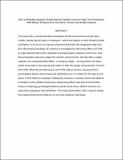Does a Flexibility/Support Organizational Initiative Improve High-Tech Employees’ Well-Being? Evidence from the Work, Family, and Health Network
Author(s)
Moen, Phyllis; Kelly, Erin L.; Fan, Wen; Lee, Shi-Rong; Almeida, David; Kossek, Ellen Ernst; Buxton, Orfeu M.; ... Show more Show less
DownloadSubjective-Wellbeing-Erin-Kelly- as submitted-0815.pdf (296.0Kb)
OPEN_ACCESS_POLICY
Open Access Policy
Creative Commons Attribution-Noncommercial-Share Alike
Terms of use
Metadata
Show full item recordAbstract
This study tests a central theoretical assumption of stress process and job strain models, namely that increases in employees’ control and support at work should promote well-being. To do so, we use a group-randomized field trial with longitudinal data from 867 information technology (IT) workers to investigate the well-being effects of STAR, an organizational intervention designed to promote greater employee control over work time and greater supervisor support for workers’ personal lives. We also offer a unique analysis of an unexpected field effect—a company merger—among workers surveyed earlier versus later in the study period, before or after the merger announcement. We find few STAR effects for the latter group, but over 12 months, STAR reduced burnout, perceived stress, and psychological distress, and increased job satisfaction, for the early survey group. STAR effects are partially mediated by increases in schedule control and declines in family-to-work conflict and burnout (an outcome and mediator) by six months. Moderating effects show that STAR benefits women in reducing psychological distress and perceived stress, and increases non-supervisory employees’ job satisfaction. This study demonstrates, with a rigorous design, that organizational-level initiatives can promote employee well-being.
Date issued
2016-01Department
Sloan School of ManagementJournal
American Sociological Review
Publisher
Sage Publications
Citation
Moen, Phyllis et al. “Does a Flexibility/Support Organizational Initiative Improve High-Tech Employees’ Well-Being? Evidence from the Work, Family, and Health Network.” American Sociological Review 81, 1 (January 2016): 134–164 © 2016 American Sociological Association
Version: Author's final manuscript
ISSN
0003-1224
1939-8271